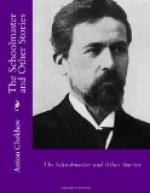“Fyodor Lukitch, is that you?” said the inspector, surprised. “You . . . have come?”
“Why not?”
“You ought to be at home, my dear fellow. You are not at all well to-day. . . .”
“I am just the same to-day as I was yesterday. And if my presence is not agreeable to you, I can go back.”
“Oh, Fyodor Lukitch, you must not talk like that! Please come in. Why, the function is really in your honour, not ours. And we are delighted to see you. Of course we are! . . .”
Within, everything was ready for the banquet. In the big dining-room adorned with German oleographs and smelling of geraniums and varnish there were two tables, a larger one for the dinner and a smaller one for the hors-d’oeuvres. The hot light of midday faintly percolated through the lowered blinds. . . . The twilight of the room, the Swiss views on the blinds, the geraniums, the thin slices of sausage on the plates, all had a naive, girlishly-sentimental air, and it was all in keeping with the master of the house, a good-natured little German with a round little stomach and affectionate, oily little eyes. Adolf Andreyitch Bruni (that was his name) was bustling round the table of hors-d’oeuvres as zealously as though it were a house on fire, filling up the wine-glasses, loading the plates, and trying in every way to please, to amuse, and to show his friendly feelings. He clapped people on the shoulder, looked into their eyes, chuckled, rubbed his hands, in fact was as ingratiating as a friendly dog.
“Whom do I behold? Fyodor Lukitch!” he said in a jerky voice, on seeing Sysoev. “How delightful! You have come in spite of your illness. Gentlemen, let me congratulate you, Fyodor Lukitch has come!”
The school-teachers were already crowding round the table and eating the hors-d’oeuvres. Sysoev frowned; he was displeased that his colleagues had begun to eat and drink without waiting for him. He noticed among them Lyapunov, the man who had dictated at the examination, and going up to him, began:
“It was not acting like a comrade! No, indeed! Gentlemanly people don’t dictate like that!”
“Good Lord, you are still harping on it!” said Lyapunov, and he frowned. “Aren’t you sick of it?”
“Yes, still harping on it! My Babkin has never made mistakes! I know why you dictated like that. You simply wanted my pupils to be floored, so that your school might seem better than mine. I know all about it! . . .”
“Why are you trying to get up a quarrel?” Lyapunov snarled. “Why the devil do you pester me?”
“Come, gentlemen,” interposed the inspector, making a woebegone face. “Is it worth while to get so heated over a trifle? Three mistakes . . . not one mistake . . . does it matter?”
“Yes, it does matter. Babkin has never made mistakes.”
“He won’t leave off,” Lyapunov went on, snorting angrily. “He takes advantage of his position as an invalid and worries us all to death. Well, sir, I am not going to consider your being ill.”




